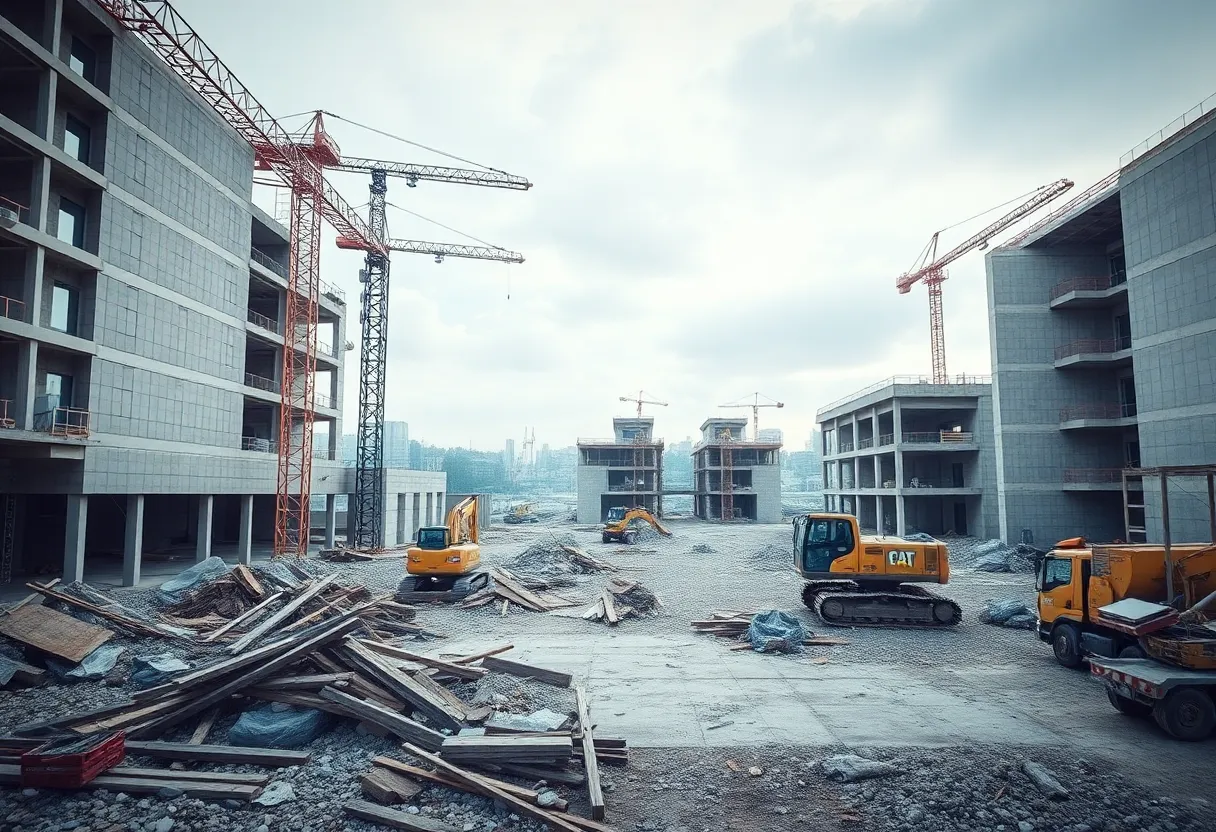News Summary
A new study has introduced a BIM-driven Digital Twin framework aimed at optimizing demolition waste management in Washington, D.C. The research addresses significant environmental challenges posed by the construction and demolition industry while enhancing economic benefits through effective recycling strategies. The framework simulates the demolition process, incorporates IoT devices, and emphasizes real-time data acquisition to improve waste management logistics. Key findings advocate for structured demolition plans that could substantially reduce energy consumption and waste production, highlighting both environmental and economic advantages.
Innovative Framework to Tackle Demolition Waste Management in Washington, D.C.
A pioneering study has unveiled a conceptual framework designed to enhance demolition waste management in Washington, D.C., significantly addressing the environmental issues caused by construction and demolition (C&D) activities. With the construction industry being a substantial contributor to global energy consumption and waste generation, this new framework aims to optimize the management of demolition, transportation, and recycling processes.
The BIM-driven Digital Twin framework at the heart of this research seeks to advance sustainable construction practices while maximizing economic benefits. By employing advanced technologies, the integration of Building Information Modeling (BIM) and Digital Twin methodologies can lead to more effective waste management strategies, crucial as C&D waste represents a large portion of global solid waste.
Demolition Simulation and Real-Time Data Management
Utilizing BIM-Navisworks software, the study simulates the demolition process of a townhouse in Washington, D.C. This simulation allows for the real-time updating of demolition data, thereby optimizing the classification and transportation of demolition waste. Such a process is expected to enhance efficiency while maintaining a commitment to sustainability.
The research examines the economic advantages of recycling demolition waste using BIM-Dynamo software. By highlighting that higher recycling rates can dramatically improve financial outcomes for waste management, the study underscores the economic potential locked in demolition materials that can be recovered through recycling.
Environmental Impact of Construction Activities
In recent years, the construction sector has accounted for as much as 36% of global energy consumption, which escalates to 50% when considering energy used in demolition. As urbanization continues to grow, finding sustainable methods to manage C&D waste is becoming increasingly critical. This study illustrates that C&D waste not only poses environmental risks but also contains significant economic value that can be harnessed through effective recycling and resource recovery practices.
Key Components of the Proposed Framework
The study identifies essential components of the proposed framework, including strategic demolition planning, efficient data management, and active stakeholder engagement. By implementing structured demolition plans, it is suggested that environmental impacts can be reduced by at least 50%. The framework is adaptable for various demolition projects, allowing for scalability in its applications.
Real-time data acquisition and management are facilitated by employing Internet of Things (IoT) devices, which enhance the overall efficiency of the waste management strategy. The strategy consists of on-site salvage and recycling, indirect recycling to treatment facilities, and managed landfilling, each of which plays a vital role in minimizing waste.
Financial Benefits of Recycling
The research employs a comprehensive cost-benefit equation to assess the financial implications of demolition and waste management processes. It proposes three distinct waste treatment plans based on varying recycling rates—50%, 80%, and 95%. The analysis reveals that while a 50% recycling rate could lead to a financial deficit, both an 80% and 95% recycling rate offer net financial benefits. This highlights the positive correlation between increased recycling rates and improved economic outcomes.
Recommendations and Future Directions
The findings of the study stress the urgent need for more effective strategies to manage the energy consumption and waste generation associated with urbanization. Incorporating advanced digital technologies such as BIM and Digital Twin not only enhances operational efficiency but also mitigates environmental harm from demolition waste.
There are existing limitations in prior frameworks, including inadequate real-time tracking and insufficient waste transportation logistics. As a response, the study suggests future research should explore the integration of artificial intelligence (AI) and intelligent systems to improve decision-making in waste management and enhance recycling processes.
Moreover, the study advocates for strengthening policy frameworks and offering financial incentives that could facilitate a smoother transition towards sustainable building practices. Adopting such measures is essential for fostering an industry that prioritizes environmental sustainability while promoting economic viability.
Deeper Dive: News & Info About This Topic
Additional Resources
- Nature: Innovative BIM-Driven Framework
- Recycling Product News: Top Recycling Events 2025
- Events DC: RFK Stadium Demolition Updates
- ScienceDirect: C&D Waste Management Research
- Times of India: New Policy for C&D Waste
- Wikipedia: Construction and Demolition Waste
- Google Search: Demolition Waste Management
- Google Scholar: Demolition Waste Management
- Encyclopedia Britannica: Construction and Demolition Waste
- Google News: Demolition Waste Management
Author: Construction CA News
The CALIFORNIA STAFF WRITER represents the experienced team at constructioncanews.com, your go-to source for actionable local news and information in California and beyond. Specializing in "news you can use," we cover essential topics like product reviews for personal and business needs, local business directories, politics, real estate trends, neighborhood insights, and state news affecting the area—with deep expertise drawn from years of dedicated reporting and strong community input, including local press releases and business updates. We deliver top reporting on high-value events such as the Rose Parade, Coachella, Comic-Con, and the California State Fair. Our coverage extends to key organizations like the California Building Industry Association and Associated General Contractors of California, plus leading businesses in technology and entertainment that power the local economy such as Apple and Alphabet. As part of the broader network, including constructionnynews.com, constructiontxnews.com, and constructionflnews.com, we provide comprehensive, credible insights into the dynamic landscape across multiple states.


